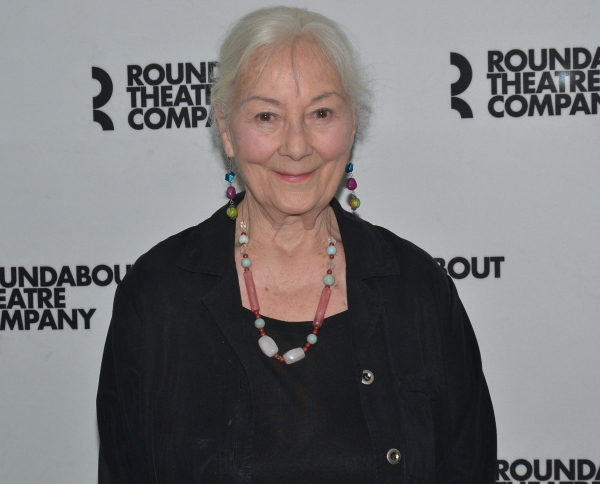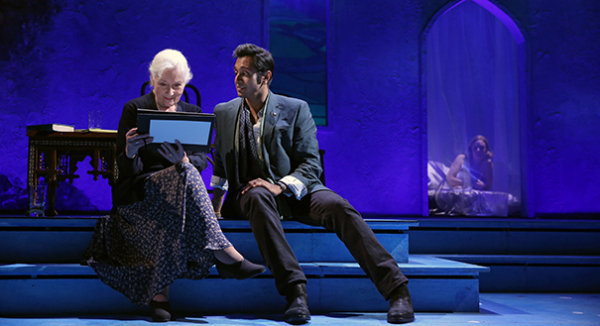Theatre Hall of Famer Rosemary Harris Rediscovers Her Indian Childhood in Tom Stoppard's Indian Ink
In between performances of Tom Stoppard's Indian Ink, now making its off-Broadway debut with the Roundabout Theatre Company, the play's Tony-winning veteran Rosemary Harris (known to many as Aunt May Parker from the Spider-Man movies) enlightens the cast with tales from her own Indian childhood. "I took some pictures to the theater yesterday from 1930," says the actress. "I'm not going to say how old I was…but they couldn't believe it."
Harris, now 86 years young, spent her formative years in India where her father served in the Royal Air Force on the North West Frontier. British poet Flora Crewe finds herself in this exact locale in Stoppard's play, which alternates between 1930s India and 1980s England where Harris' character dwells. She takes on the role of Eleanor Swan — sister of the now-deceased Crewe, who has left evidence of her personal history in a series of letters that she sent to Eleanor during her time in India.
This familiar milieu inspired a joyful conversation with Harris, who shared anecdotes from her exotic childhood, some choice tactics for scaring taxi drivers, and a permanently ingrained memory of her first stroll across a "stage."

(© David Gordon)
Were you familiar with this play before this production?
I was. My sister and I spent our early upbringing in India, so we went to see it when it was done in London in the nineties. There's a wonderful book by Rumer Godden called Two Under the Indian Sun and we always felt that if we could write like Rumer Godden, that's the book we would write.
It must have been such an interesting way to grow up.
It was very vivid. Of course I was only a child and I didn't know anything about the political ramifications of colonialism. I just knew I had an ayah (maid) who was Indian and I loved her. She taught me Hindustani, so I spoke quite a lot of Hindustani as a child. Sometimes I try it out on taxi drivers. They nearly crash. [laughs]
Do you feel like Stoppard accurately captured the environment?
I would think so. [His plays] are very dense [but] romantic too and very moving. [There's a part in Indian Ink] when I go to a book lying on the table and I give it to [the character] Anish and I say, "This is yours. It was your father's," and I used to burst into tears when I handed it to him. I couldn't understand why. It's just something in Tom's writing. Underneath it all, there is this incredible emotion — in spite of all of his erudition.
The personal lives of artists, like the play's Flora Crewe, seem to be sources of endless fascination for people. Do you share that interest in artists' histories?
I love biographies. I just feast on biographies. Especially of actors [who] I've admired and loved. But as Eleanor says, biography is the best possible excuse for getting people wrong. I read a lot of biographies of Sir Lawrence Olivier and I think, That doesn't sound like the Sir Lawrence I know. I'm old enough to have lived in his era and people are writing about him who are not of his era and I think no no no, that's not right.
If one hundred years from now people were to look back on the details of your career, what would you hope they infer about you?
Oh my gosh, I can't think what they would say. I love pretending to be other people. My first performance was when I was four years old in India and I played the queen in the Dance of the Seven Veils. It's a nonspeaking role, so I always say never underestimate a nonspeaking role. My sister, who was twelve, a boy of about eleven, and I put on this concert and my parents didn't know anything about it. They suddenly saw all of these people coming up the driveway wanting a gin and tonic and said "What are you doing here?" They said "Well, we've been invited to the concert."
You served gin and tonics to your audience at four years old?
Well no, my parents had to. I can hear it in my ears now. I was standing in the so-called wings with my ayah. Just as the seventh veil is about to come off, the narrator says, "And then the door opened and the queen came walking in." And that was my cue to go onstage. I can remember it as vividly as it happened yesterday. I was supposed to walk right across the so-called stage and [my sister] taught me how to kick my train so I could turn around. Then I walked all the way back in complete silence. I don't know what the audience must have thought but as far as I was concerned I was the queen. It goes to show, acting can be taught in a way but I think it's also an instinct. You either have that instinct of wanting to be somebody else or you don't. It's not something you can teach somebody if they don't relish it.

(© Joan Marcus)










